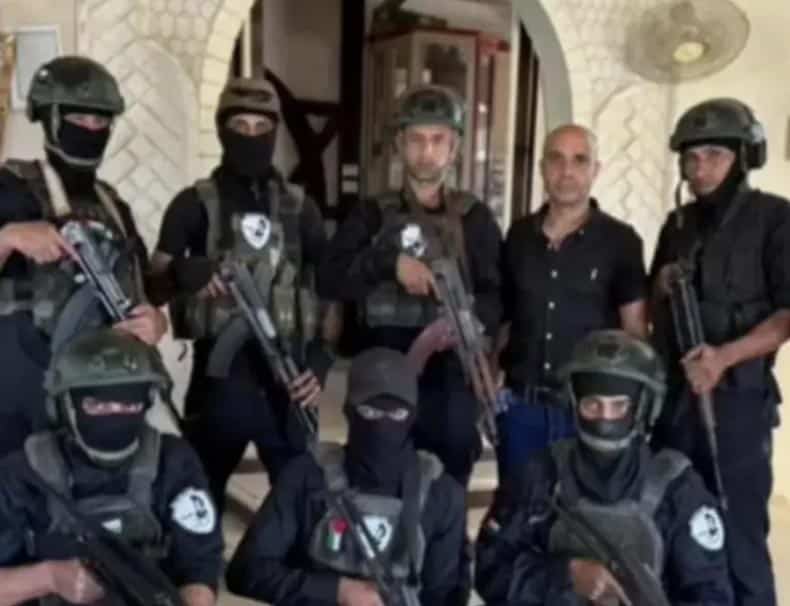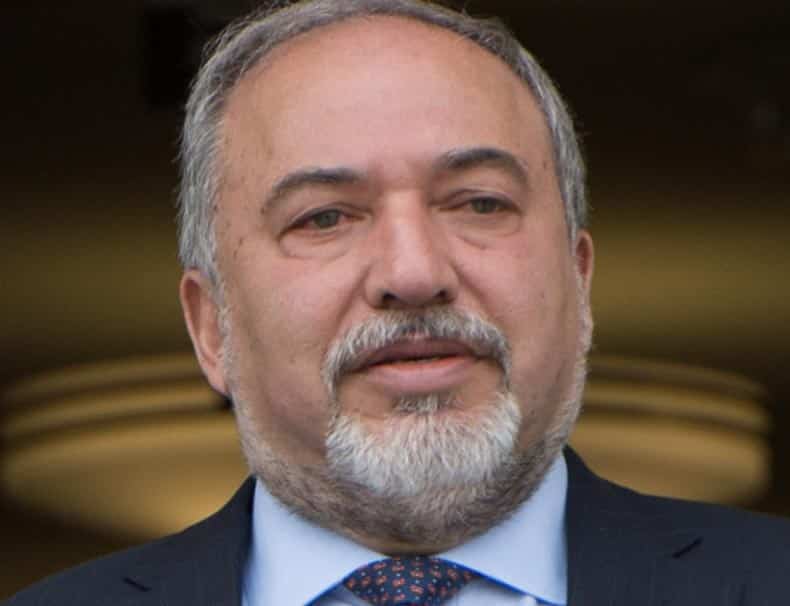The chairman of the “Israel Beiteinu” party, Knesset Member Avigdor Lieberman, revealed in an interview on Israel Radio’s Reshet Bet on June 5 that in recent months, the Israeli defense establishment has transferred dozens to hundreds of Kalashnikov rifles and pistols “to various clans in Gaza, some affiliated with ISIS.” According to him, this assistance—transferred to criminal families in the Gaza Strip—was carried out under the leadership of the Israel Security Agency (Shin Bet), upon the recommendation and approval of the IDF and under the directives of Prime Minister Benjamin Netanyahu. This was done without obtaining the required prior approval from the Cabinet.
Lieberman further asserted that this assistance was provided “just as Netanyahu previously tried to build up Hamas as a counterweight to the Palestinian Authority. Now he’s building ISIS as a counterweight to Hamas.” Netanyahu’s office did not deny the claims, stating that “Israel is working to bring about Hamas’s defeat through various and diverse means, as recommended by all heads of the security establishment.”
In practice, the recipient of the weapons, which were seized by IDF forces during Operation Iron Swords, is a new Palestinian force consisting of several hundred armed men (some of them former prisoners released from Hamas prisons). This force operates in the Rafah area, particularly in the eastern part of the southern city, and goes by the name “Popular Forces.”
The force is headed by Yasser Abu Shabab, a 32-year-old native of Rafah and member of the Bedouin al-Tarabin tribe—one of the largest in the Gaza Strip (with members also living in the Sinai Peninsula and the Negev). Initially, Abu Shabab referred to the force as the “Counter-Terrorism Unit,” but since May 10 of this year, it has been presented under its new name—the “Popular Forces.” The members of the force are armed with assault rifles, wear uniforms bearing the Palestinian flag with the English inscription “Counter Terrorism Unit,” and are deployed mainly in the area of Rafah, near the Kerem Shalom crossing.
Israel Challenges Hamas from Within
The adult life of Abu Shabab includes elements of terrorist activity against Israel (rocket fire), ties to ISIS, and a history of involvement in criminal offenses. Until the outbreak of Operation Iron Swords, Abu Shabab was imprisoned by Hamas in Gaza on charges of theft and drug trafficking. Still, he was released under the cover of an IDF strike on Hamas security facilities at the beginning of the war. In November last year, Hamas attempted a targeted assassination of Abu Shabab in the vicinity of the European Hospital in Khan Yunis. Still, he was unharmed and managed to escape, while two of his associates, including his brother Fathi, were killed in the sophisticated ambush laid for them.
From all available information—reported to this author by accessible sources in Gaza and Ramallah—it appears that Abu Shabab’s armed militia has indeed been operating in recent months in coordination with Israel in an area under the operational control of IDF forces in eastern Rafah. Members of this militia have primarily undertaken missions of securing convoys carrying humanitarian aid to distribution sites in the southern Gaza Strip.
On the other hand, an internal UN memorandum recently leaked to The Washington Post described Abu Shabab as “the most influential figure behind the systematic looting of aid, under the passive, if not active, cover of the IDF.” Arab media have also reported that members of this group assisted Palestinian residents of Khan Yunis in evacuating westward to the al-Mawasi area, following announcements by the IDF Arabic spokesperson urging them to do so.
From the perspective of the Israeli defense establishment, the purpose of transferring weapons to Abu Shabab’s group was to challenge Hamas—to increase pressure on the organization, limit its influence, and restrict its operations on the ground. Indeed, in Netanyahu’s public comments to the media regarding this move, it was stated that it was taken on the recommendation of security officials. “What’s wrong with that? It saves the lives of IDF soldiers,” said the Prime Minister. At the same time, he harshly criticized Lieberman directly, arguing that his disclosure of the matter “only helped Hamas” and declaring that “he doesn’t care, and that’s very serious.”
Members of Abu Shabab’s force have attacked Hamas and claimed that it has lost its legitimacy, as was recently demonstrated in protests against the organization in various parts of the Gaza Strip attended by hundreds of Palestinians. They argued that Hamas seeks to continue the looting of humanitarian aid and that it continues to lead “to destruction and ruin.” They further announced that a large area in eastern Rafah has been cleared, and that hundreds of Palestinian families now reside there with their return coordinated with the “Palestinian legitimacy”—a statement suggesting that Abu Shabab’s group operates according to directives transmitted by the Palestinian Authority and in coordination with it.

Hamas Calls to “Pursue the American Government”
In a leaflet distributed on June 8, Hamas addressed the activity of Abu Shabab’s militia, without explicitly mentioning it by name. The text of the leaflet called on the Palestinian people not to be deceived by false promises from “the Zionist occupation or mercenaries”. It warned against “falling for the Zionist enemy’s plan to create dubious bodies and collaborators as a substitute for UNRWA, the UN Relief and Works Agency.”
Furthermore, Hamas asserted that the food distribution centers for Palestinians, operated by the Americans, are intended to replace UNRWA and eliminate Palestinian national aspirations by reducing them to a mere humanitarian issue. In this way, according to Hamas, the United States seeks to bring about forced migration and ethnic cleansing by “emptying the Gaza Strip of its inhabitants to implement the plan of the criminal Trump.” Hamas called “on all legitimate and legal international and Arab organizations, and on all free people of the world, to pursue the inhumane American establishment, which is playing a negative security and intelligence role that has led to the deaths of 126 of our people suffering from hunger under the criminal Zionist siege.”
In addition, Hamas called for “pressure on the Zionist entity and the American administration to restore food distribution through UN-affiliated international organizations, headed by UNRWA, as it is the only body capable of carrying out this task in a way that preserves the dignity and humanity of our people in Gaza.” The leaflet concluded with a declaration that the Palestinian resistance possesses “the strength and determination to strike with full force at the hands of any body or individual who negotiates with the enemy’s plans… and all collaborators, agents, and criminal armed gangs will be legitimate targets for the resistance forces.”

Abu Shabab Declares “National Aspirations”
In his first audio statement, lasting about four minutes, Abu Shabab addressed the Palestinian people. He emphasized that “there is one thing we need to focus on, and that is protecting our people from the terror of Hamas, from their unacceptable control over the public, and from their refusal to relinquish power.” He clarified that he has no connection with any country or international organization. He stated that his people maintain cooperative ties with the Palestinian Authority based on “the supreme interest of the Palestinian people.”
Regarding relations with Israel, Abu Shabab noted that no meetings were taking place with IDF officers, and that “if there is any coordination, its purposes are humanitarian, for the benefit of the people in the eastern areas of Rafah, and through mediation channels.”
Additionally, he claimed that Hamas operatives had carried out massacres in which “close to 25 innocent people were killed, including children, women, and people with disabilities.” He pointed to his demand “to open an international corridor (to the Rafah area) that would guarantee the safe return of tens of thousands under international supervision.” He noted in this context that “we conduct security screening with the assistance of Palestinian intelligence (of the Palestinian Authority), which cooperates with us to ensure that terrorists do not enter and destroy the plan of liberation from Hamas.”
Abu Shabab also emphasized that the force under his command requires military support to arm new volunteers joining its ranks and to train them. He concluded the statement by declaring that “we have great national aspirations to seize additional areas currently controlled by Hamas through armed force, to liberate people from this oppression, and to achieve dignity. We place our hope in the free people of the world and in all those who believe in justice and dignity to stand by our side.”
Immediately after the public exposure of Abu Shabab’s new organization, the Palestinian Authority refrained from expressing an official position regarding it. However, this writer has learned that senior officials within the PA, especially those close to President Mahmoud Abbas, urged him to express an unequivocal position against it publicly. Once the cooperation between the new organization and Israel was revealed and became widely known following Lieberman’s statement, there was no doubt that it was an armed group recruited in the service of Israel and advancing its security interests in the Gaza Strip.

From Complete Control to Erosion of Public Standing
The activity of the new organization is tangible evidence of Hamas’s inability, under the current circumstances and amid the ongoing military pressure exerted by IDF forces, to maintain complete and adequate control over the territory and to bear responsibility for ensuring security and public order. This situation damages the organization’s public standing and erodes its legitimacy among the Palestinian public. As a result of the blows Hamas has recently suffered at the hands of the IDF, it has found itself cornered, with its public strength steadily diminishing. Under these circumstances, it is attempting to confront the new organization both with threatening statements and through efforts to physically harm the operatives and supporters who stand by its side.
Hamas is demonstrating a unified and unequivocal stance against Abu Shabab’s new organization, whose activities pose a direct threat to Hamas’s standing on the ground and intensify the pressure being placed upon it. This is particularly evident now, as Hamas faces increasing demands to moderate and soften its positions in a way that would ultimately enable concrete agreements with Israel regarding a ceasefire and the release of hostages.
As noted, the activity of Abu Shabab’s “Popular Forces” highlights the weakening of Hamas’s governing grip over the Gaza Strip and its security control. However, the public media exposure of this activity, under the auspices and assistance of Israel, has had negative implications from Israel’s perspective. This is because the militia’s activity, if it had not been connected to Israel in one way or another, could have continued operating as an ostensibly independent, discreet, and covert force on the ground. Under such circumstances, it would not have faced severe criticism in the Palestinian street as a group affiliated with, cooperating with, or effectively serving as an advance outpost of “the Israeli enemy.”
The activity of Abu Shabab’s new militia has forced Hamas to confront it publicly in the media arena as well. Against this backdrop, Hamas’s announcement on June 10 of the arrest of Issam al-Nabahin is particularly noteworthy. He was presented as Abu Shabab’s deputy, had fought in the ranks of ISIS in Egypt, and was a former prisoner in Hamas’s jail in Gaza (sentenced there after being accused of murdering a police officer). He managed to escape from prison in the early days of Operation Iron Swords.
No Guarantee of Automatic Support for Israel
The question of the new organization’s connection to the Palestinian Authority is an issue requiring clarification and response. Based on information conveyed to the author of this article from reliable and accessible Palestinian sources, there is indeed a connection, involvement, and even assistance being provided by elements in the Palestinian Authority—almost all of them of Gazan origin—to the “Popular Forces” led by Abu Shabab. In this context, mention should be made of Mahmoud al-Habbash, religious affairs advisor to Palestinian Authority President Mahmoud Abbas, and his aide, Khaled Baroud. The relationship between PA officials and Abu Shabab’s “Popular Forces” can be explained by an attempt to establish a strong grassroots force on the ground to challenge Hamas’s rule and promote the PA’s renewed takeover of the Gaza Strip. However, the public exposure of the ties between the “Popular Forces,” Israel, and official Palestinian elements—who already lack public support among Palestinians—is likely to prompt Mahmoud Abbas soon to publicly disavow the new organization and adopt a more precise and more decisive stance against it.
According to claims published in statements from Hamas, intelligence officials from an Arab country are involved in training members of Abu Shabab’s organization and providing them with financial aid, vehicles, and night-vision equipment. A video circulating on social media even showed a member of Abu Shabab’s group standing next to a car bearing a license plate from the United Arab Emirates.
Highly reliable information obtained by the author indicates that business people and merchants in the Gaza Strip are also among those supporting Abu Shabab’s organization. This is because their activity on the ground may enable them to exploit humanitarian aid for profit by selling it to the population at exorbitant prices.
Israel’s current support for Abu Shabab’s “Popular Forces” evokes memories of similar cases in the past, in which Israel provided targeted military assistance to various groups in the Middle East that challenged the existing political and governmental order. Through such moves, Israel sought to improve or solidify the status of those groups and promote particularistic national aspirations and interests. Such was the case, for example, with Israel’s support for the Kurdish minority in Iraq and the Christian Phalangists in Lebanon. In the present case, however, the national element is not dominant—at least for now—in the agenda of Abu Shabab’s men, although it should not be ignored that they view themselves as an integral part of Palestinian identity.
The objective behind Israel’s support for them is to increase the pressure on Hamas, in addition to the ongoing operations of the IDF on the ground, through local power elements that will further erode Hamas’s standing and diminish its public support, encouraging additional segments of the population to stand against it publicly, as seen in the protests and demonstrations in various parts of the Gaza Strip in recent months.
Nevertheless, it is essential to accompany this assessment of Abu Shabab’s forces’ activity against Hamas on behalf of Israel with a cautionary note. Israel’s support for them does not guarantee their automatic alignment with Israel, and it may ultimately prove to be a problematic and insufficiently calculated gamble, the negative consequences of which for Israel’s security interests could outweigh the benefits it hopes to gain.
In this context, it is essential to note that the Prime Minister’s public acknowledgment of Israeli assistance to Abu Shabab’s organization, in response to the exposure of the matter by Lieberman in the media, is problematic, to say the least, from the perspective of Israel’s security interests. In practice, it risks tarnishing Abu Shabab’s “Popular Forces” as collaborators in a way that may affect their future activities. Against this backdrop, it is necessary to consider and prepare for the development of scenarios that could feature a “turning of arms,” potentially manifesting in hostile activity by Abu Shabab’s men against IDF forces on the ground.









